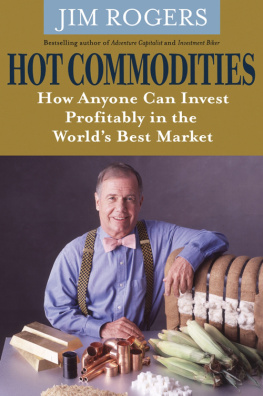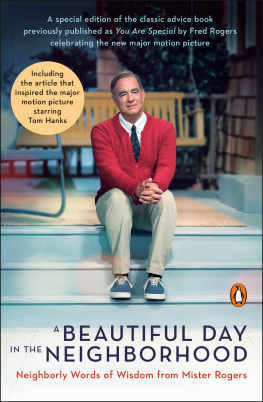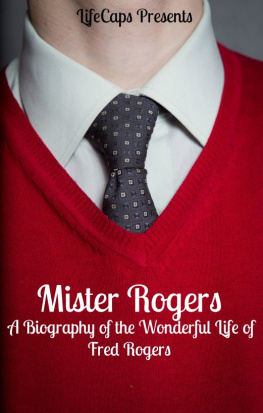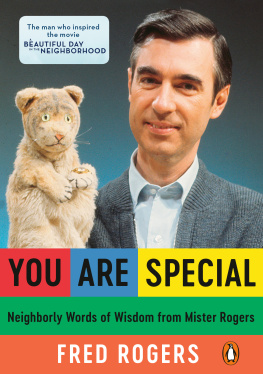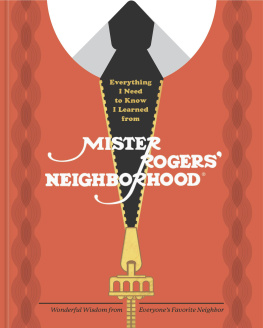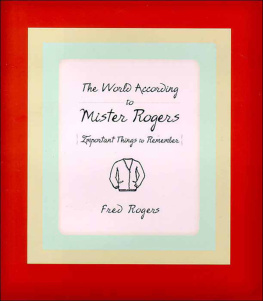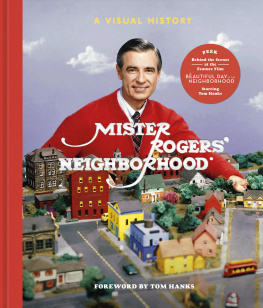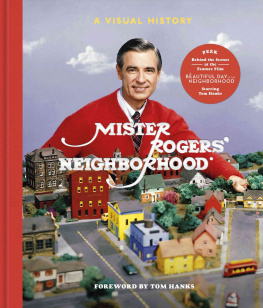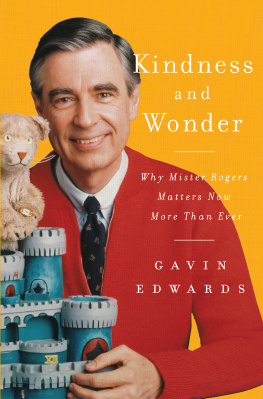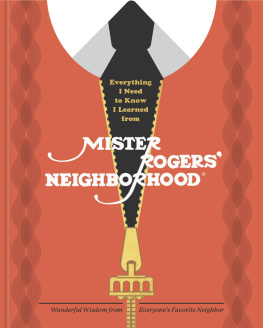Many Ways to Say
I Love You
WISDOM FOR PARENTS AND CHILDREN
FROM MISTER ROGERS
FRED ROGERS

T HIS BOOK IS DEDICATED TO ALL THOSE
WHO HAVE CARINGLY GIVEN US LOVE
AND TO THOSE WHO
GRACIOUSLY RECEIVE OUR LOVE.
CONTENTS
FOREWORD
by Joanne Rogers
My own wish for children and parents alike is that they learn to find love and joy even amidst the worlds and their own imperfections
F RED R OGERS
Those of us who are parents certainly know about imperfectionsour own and our childrens! Parenting is a struggle. I was always touched when people would tell me how much theyve learned from Fred thats helped them in their parenting, but I have a hunch that they thought he had some magical gift with children. He and I had to work at being good parents just like everyone else.
As I think about our own early experience in parenting, what I remember is that we were a not-so-young mother and father, both thirty-one years old, when our first son was born. We had been married for seven years, and we were overjoyed to be a family at last. I can also remember how insecure Fred and I both felt over the prospect of taking care of this tiny person. At the same time, we felt ready for the challenges ahead. Our second son was born just twenty-one months later. Those were busy but happy times for Fred and me and for both sets of grandparents. It was a great blessing that both boys were essentially very healthy, so we were gently eased into parenthood.
Fred was understandably very protective of our family life, but he did share some of his feelings about our parenting in some writing that he did a number of years ago:
Looking back over the years of parenting that my wife and I have done with our two boys, I feel good about who we are and what weve done. I dont mean we were perfect parents. Not at all. Our years with our children were marked by plenty of inappropriate responses. Both Joanne and I can recall many times when we wish now wed said or done something different. But we didnt, and weve learned not to feel too guilty about that. What gives me my good feelings is that we always cared and always tried to do our best. Our two sons are very different one from the other; yet, at the core of each of them there seems to be a basic kindness, a caring, and a willingness to try.
Ive heard young parents complain about the way they were treated by their own parents, and they say, Ill never make that mistake with my kids! And probably the most honest response to that is, Perhaps you wont make that mistake, but youll surely make your own different ones. Well, we certainly made our share of mistakes. But whatever we did, our sons appear to have forgiven us, and now that theyre grown, that core of kindness, caring, and willingness to try is still very much intact. They know our love for them was always unconditional.
As Fred said in one of his Neighborhood songs, There are many ways to say I love you, and of course, we all have our own ways of expressing that love. But however we say it, Fred believed deeply that love is essential in the life of a child. I remember when he first really understood what that meant. Many years ago I traveled with Fred to London where he had the rare privilege of attending a case presentation by Anna Freud, the noted child analyst and daughter of Sigmund Freud. The child whose case was being discussed that day came from the most unhealthy emotional environment imaginable and was having some problems with the staff, yet was functioning rather well in the group. Typically in a case study, what comes next is the experts perspective of the childs problems. But what Anna Freud said that day was something very different: We need to try to understand why, in spite of all the trauma, is this child emotionally healthy and thriving? Fred was fascinated with her question. What helps a child to be able to grow into a confident, competent, caring human being, in spite of being at risk in so many dimensions?
That focus on the positive made such an impression on Fred that it became a central part of his philosophy. I think it resonated so deeply with him because he always felt more comfortable focusing on strengths rather than on weaknesses, maybe in part because of his spiritual background. Years later, he found his own way to answer Anna Freuds question:
The roots of a childs ability to cope and thrive, regardless of circumstance, lie in that childs having had at least a small, safe place (an apartment, a room, a lap) in which, in the companionship of a loving person, that child could discover that he or she was loveable and capable of loving in return. If a child finds this during the first years of life, he or she can grow up to be a competent, healthy person.
Guided by Dr. Margaret McFarland, his mentor in his graduate work in child development, Fred learned firsthand what it meant to offer that kind of safe place for children and their closest caregivers. Under her supervision, he began working directly, one on one, with young children. Thats where he learned about providing an extra measure of security that could help strengthen both children and their parents.
A few years later, when Fred set about to create his childrens television program, that approach became the cornerstone for his Neighborhood. He set out to provide a kind, caring, and safe placea place that was safe for all children, and for all kinds of feelings. As a neighbor, he wanted to support what is healthy in children. He sometimes made a point of defining his relationship for children, saying something like, Im a television friend. Thats different from being a father or a mother. In our family, there are times when our sons and I get angry with each other and have to work things out. Family life is like that.
With his remarkable ability to connect with his viewing audience on a one-to-one basis, he succeeded in giving love through this often all-too-impersonal medium. In his mind, there was sacred spacehallowed groundbetween what he was giving through the television and what the viewer was receiving.
So many parents told Fred that Mister Rogers Neighborhood was a safe place for them as well. They thanked him for helping them be better able to see the world through the eyes of their childrenand for nourishing them with the messages of love and humanness that we all need, no matter how old we are. He wanted to be an ally for them, so you can imagine how much it touched him to hear them say, Youve made me a better parent.
Over the years Fred also received thousands of letters from parents who wrote about some concern they had about their children and asked for some advice. What he heard in their comments were their strengthshow much they obviously cared about their children. He knew thats what would help them keep working on dealing with their concerns. Often he closed his response with, Your children are truly fortunate to be growing up in your caring family. Ill never forget one particular letter that he shared with me from a mother who wrote back, saying that she was moved to tears from those wordsand that it strengthened her long afterward.
Somehow Fred was able to find a balance between applauding parents and reminding them of how complicated and challenging parenting is. I think he trusted that if we as parents feel were being supported, well find the best in ourselves to give to our children well find the patience to weather the ups and downs of everyday family life well find the willingness to look for help if were struggling.
Fred lived to see our older son become a wonderful father. Sadly, he missed the birth of our younger sons child by a few weeks, but he knew the birth was coming soon and was excited for our younger son to become a parent. I have been fortunate to witness both sons fatherhoodand to see such healthy traits in all three of our grandsons. I am deeply grateful to my sons and to Fred, whose beautiful spirit gave them life and dwells in them.
Next page




